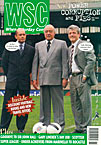 Simon Evans tells the tale of how he co-wrote The Rough Guide to European Football
Simon Evans tells the tale of how he co-wrote The Rough Guide to European Football
The Hungarian train conductor thought we were two very strange young men. Two Englishmen sat in a train travelling to see Videoton, UEFA Cup finalists in 1985, in a relegation play-off in Salgotarjan, a small ex-mining town in the depressed East of Hungary.
Peterjon Cresswell and I are journalists based in Budapest. But there was no editor commissioning the Videoton match and no news agency desperate for a quote from Bela Olah, Slagotarjan’s veteran midfield general. We were doing it for fun – travelling around Eastern Europe, collecting football tales and hangovers.
On our travels we had turned to normally reliable sources to help us prepare. But the guide books barely mention football. An obscure cathedral in Barcelona will get a full-page write up. The Nou Camp will barely get a mention. The average bar reviewer, even for the hipper travel titles, will go out of his way to avoid the kind of simple local bars that fans frequent. We felt there was a need for a book which provided those details and went well beyond the straightforward “supporters guides” that have popped up in the UK with their limited info on Do it All car parks and Kentucky Fried Chickens.
For two years we have travelled on the continent, attending games, talking to fans, officials and reporters. We found Europe’s Top 100 Football Bars and scores of restaurants with walls full of soccer memorabilia. We found the only place where you can buy that Dukla Prague away strip. I ate in a restaurant in Istanbul which was decorated with a photo of my mother-in-law’s uncle, who until then I never knew had coached Fenerbahce in the Fifties.
We found plenty of stories from the history of European football that have never been written about – at least not in English. Stories about Nicolae Ceaucescu’s local village team and their remarkable rise through the divisions, Swedish bankruptcies, the English “missionaries” who introduced the game to the continent.
Finding people to sit down with and talk football was never difficult. The bulk of the material came from the mouths of fans. A lad in a sports shop in Kadikoy, Istanbul, took a two-hour tea-break to explain in great detail why Hakan Suker was a despicable playboy. An unemployed teenage mod gave me a tour of the “other Stockholm” – Sodermalm, home to Hammarby, the Swedish capital’s most popular and least successful team. The tour took in a statue of “Nacka” Skoglund, a Hammarby boy, once a star of the San Siro, whose alcohol soaked life ended in a pile of vomit on a park bench.
There was a middle-aged referee from the Belgrade City League who drove me around the many stadiums of his native city, refusing petrol money in a country where petrol was as hard to find as a Croat Red Star fan. There were the Celtic fans celebrating the rise in their club’s shares which were paying for that year’s Summer holiday. And there were the Glaswegian brickies who had adopted FC Copenhagen as their team and who hated Brondby with a rage no Dane could ever match.
But it wasn’t all beer and press tickets. I needed intervention from a friendly Romanian ecologist to explain to the irate security guards at Dinamo Bucharest, once the team of the Securitate, that the notes I was taking about the stadium were not going to be handed over to the enemies of the Romanian state.
Peterjon found himself in a riot in Salonika, as fierce as the snowstorm that had preceded it, with angry Greek fans pelletting the press box with all-manner of missiles. In Budapest I was trapped in a tram full of Ujpest fans, ambushed by rival hooligans from Ferencvaros who bricked the tram windows and showered us with glass – a reminder that European football has not yet become one-big, scarf-swapping family
But the odd scrape aside, the two years researching and writing The Rough Guide to European Football gave us a unique chance to take the pulse on a football continent in change. We did enough pavement pounding to find out that you can actually have a good night out in cities like Bucharest and that there is no longer any excuse to do what Glasgow Rangers fans did after a Champions League game with Steaua – stock up on vodka and sit in McDonalds all night.
Europe is there for the taking – enjoy it.
From WSC 129 November 1997. What was happening this month